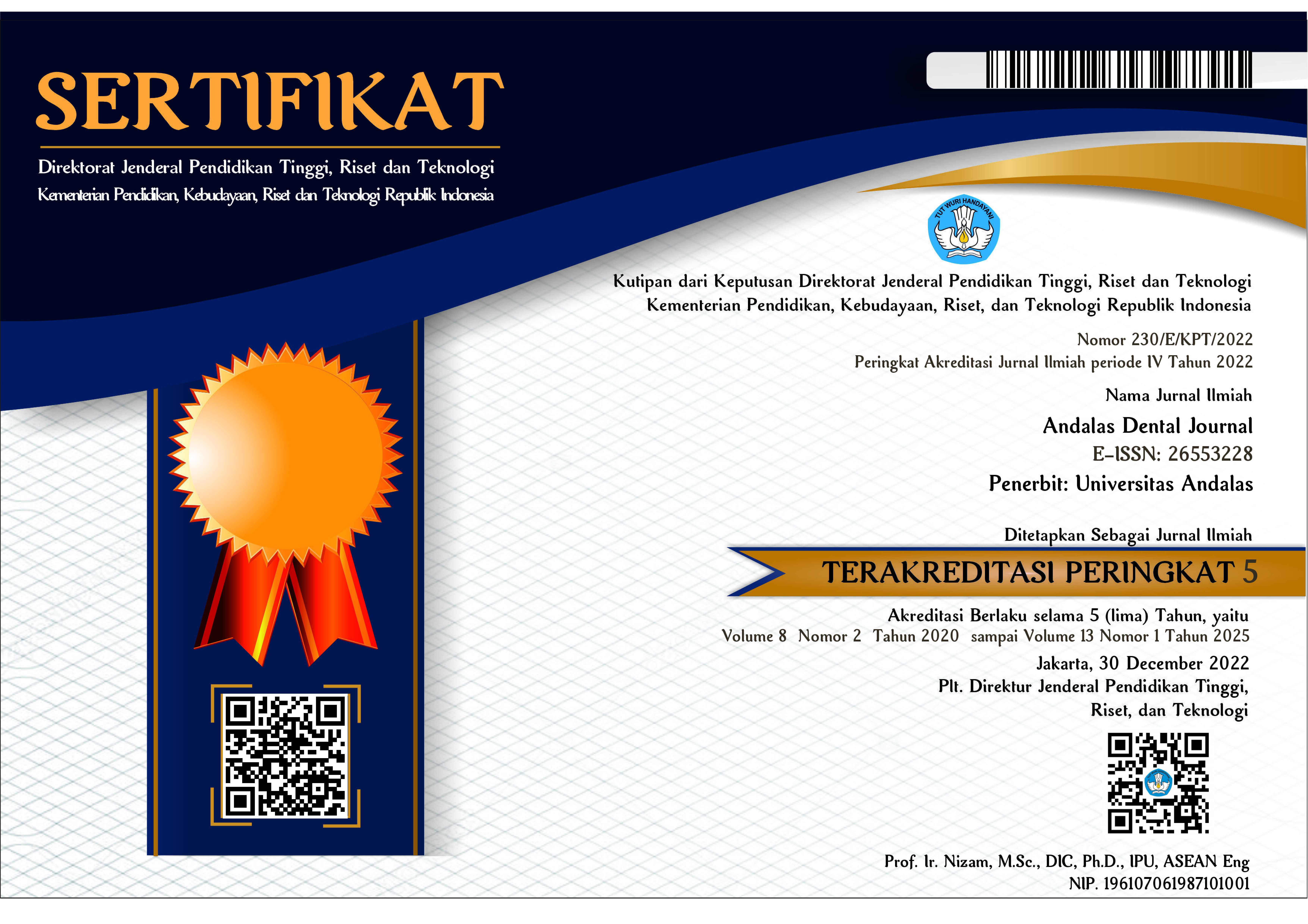Pengaruh Pengetahuan dan Sikap Ibu yang Bekerja Dari Rumah Selama Work Form Home Terhadap Perilaku Anak Dalam Menjaga Kebersihan Rongga Mulut dimasa Pandemi Covid-19
Abstract
The covid-19 pandemic is hitting the world including Indonesia. Work from home (WFH) is one of the Indonesian goverment's policy to prevent the spread of covid-19. The mother’s knowledge, attitude, and practice regarding oral health are the important indicator that reflect their children's oral health behaviour. Objective: to analyse the relationship of mother's knowledge and practice to the children's oral health behaviour during WFH in the covid-19 era. Method: This is a cross-sectional study used the purposive sampling techniques. Thirty respondents were selected by the following criterias: women; have children aged 12 months until 12 years; work outside the home as employees; and willing to participated in this study. Respondents were instructed to fill the self-administered questionnaire through the Google Form application. Data of the mother's knowledge, practice and the children's behaviour were collected, then analysed by computerizing system. Results: Good knowledge and positive practice about oral health was represented by each 73,3% respondents. Approximately 76,7% of the children had satisfaction behaviour and only 23,3% had unsatisfaction of oral health behaviour. The study shows a statistical significant relationship of mothers’ knowledge level (p=0,003) and mother's practices (p=0,044) to their children's behavior toward oral health care. Conclusion: There is a significant relationship between mother's knowledge and practices to the children's oral health behaviour. Good knowledge and positive attitude of mothers determined the satisfaction of children's behaviour in the oral health care, especially int the covid-19 era.
References
2. Kemenkes. Pusat Data dan Informasi Kesehatan Kemenkes RI. 2014. Jakarta: Kemenkes RI.
3. Kurniawati N, Imran H. Hubungan Perilaku Ibu Dirumah Dengan Kebersihan Gigi Dan Mulut Pada Murid Kelas V Sekolah Dasar Negeri Di Kota Banda Aceh. Jurnal Averrous 2019; 5(1).
4. Kementerian Kesehatan RI. Riset Kesehatan Dasar (Riskesdas). Laporan Hasil Riset Kesehatan Dasar Nasional. Badan Litbangkes Depkes Republik Indonesia; 2018.
5. Maftuchan M, Hadi EN. Kiddie Doctors Education Strategy in Improving the Knowledge, Attitude, and Oral Hygiene Status of Elementary School Children.J Int Soc Prev Community Dent. 2020; 10(5). 549–554. doi: 10.4103/jispcd.JISPCD_116_20
6. Notoatmodjo S. Promosi Kesehatan dan Perilaku Kesehatan. 2014. Jakarta: Rineka Cipta.
7. Abadi, Suparno. Perspektif Orang Tua pada Kesehatan Gigi Anak Usia Dini. Jurnal Obsesi: Jurnal Pendidikan Anak Usia Dini 2019; 3(1): 161-169.
8. Lembaga Penelitian dan Pengembangan Kesehatan Nasional. Laporan Penelitian Fasilitas Kesehatan. Jakarta, Indonesia: Kementerian Kesehatan Republik Indonesia; 2011.
9. Alharbi A, Alharbi S, Alqaidi S. Guidelines for dental care provision during the COVID-19 pandemic. Saudi Dental Journal. 2020; 32(4), 181–186. https://doi.org/10.1016/j.sdentj.2020.04.001
10. Arora P, Kaur J, Kaur J, Arora A. Teledentistry: An innovative tool for the underserved population. Digital Medicine. 2019; 5(1): 6. https://doi.org/10.4103/digm.digm_13_18
11. Rahman N, Nathwani S, Kandiah T. Teledentistry from a patient perspective during the coronavirus pandemic. British Dental Journal. 2020; 229(3), 1–4. https://doi.org/10.1038/s41415-020-1919-6
12. Singh S, Rana A, Jain V, Sybil D. Effect of COVID-19 Lockdown on Dental Care of Patients: A Survey Analysis. International Journal of Research and Review. 2020; 7(11): 1–8. https://doi.org/10.4444/ijrr.1002/2371
13. Subbalekshmi T, Anandan V, Apathsakayan R. Use of a Teledentistry-based Program for Screening of Early Childhood Caries in a School Setting. Cureus. 2017; 9(7): 1–7. https://doi.org/10.7759/cureus.1416
14. Purwanto A, Asbari M, Fahlevi M, Mufid A, Agistiawati E, Cahyono Y, Suryani P. Impact of Work from Home (WFH) on Indonesian Teachers Performance During the Covid-19 Pandemic: An Exploratory Study. International Journal of Advanced Science and Technology. 2020; 29(5): 6235 – 6244
15. Salama AA, Konsowab EM, Alkalasha SH. Mothers’ knowledge, attitude, and practice regarding their primary school children’s oral hygiene. Menoufia Medical Journal. 2020; 33(1): 11-17. doi: 10.4103/mmj.mmj_300_19.
16. Mahmoud N, Kowash M, Hussein I, Hassan A, Al Halabi M. Oral health knowledge, attitude, and practices of Sharjah mothers of preschool children, United Arab Emirates. J Int Soc Prev Community Dent. 2017; 7: 308–314.
17. Alzaidi S, Alanazi I, Mohammed O, Abu Nawas O, Mulla M. Maternal knowledge and practice in Tabuk, Saudi Arabia. Egypt J Hosp Med. 2017; 70: 1544–1551.
18. Azizah AY, Erawati S, Nababan I. Edukasi Online Terhadap Perubahan Perilaku Menjaga Kebersihan Gigi Pada Mulut Selama Masa Pandemi. Jurnal Ilmiah Pannmed (Pharmacyst, Analyst, Nurse, Nutrition, Midwivery, Environment, Dental Hygiene) 2021; Vol 16 (1): 224-228.
19. Babu N, Doraikannan S, Indiran M, Rathinavelu. Assessing knowledge, attitude, and practice of parents regarding infant oral health among outpatients of private dental college in Chennai. Drug Invention Today. 2018; 10 Special Issue: 2849–2853.
20. Chand S, Chand S, Dhanker K, Chaudhary A. Impact of mothers’ oral hygiene knowledge and practice on oral hygiene status of their 12-year-old children. J Indian Assoc Public Health Dent 2019; 12:323–329.
21. Chen L, Hong J, Xiong D, Zhang L, Li Y, Huang S, Hua F. Are parents’ education levels associated with either their oral health knowledge or their children’s oral health behaviors? A survey of 8446 families in Wuhan. BMC Oral Health. 2020; 20: 203.
Copyright (c) 2020 Desy Purnama Sari

This work is licensed under a Creative Commons Attribution-ShareAlike 4.0 International License.















